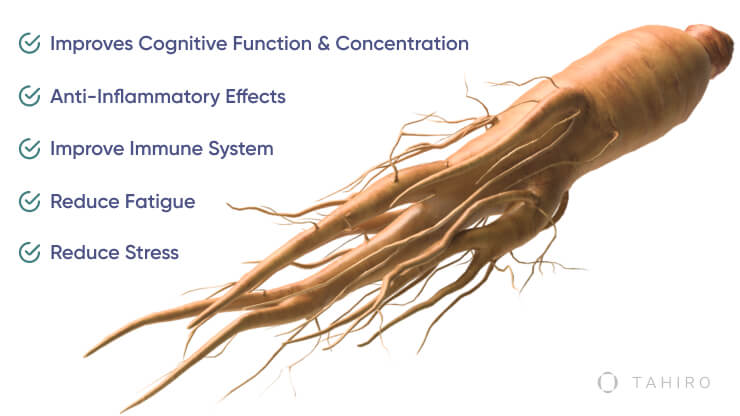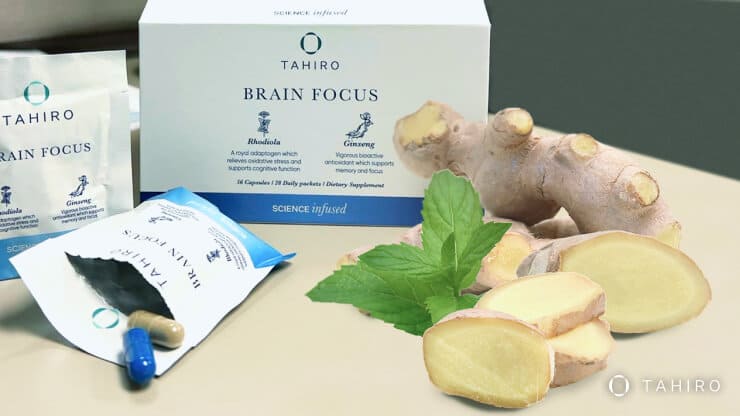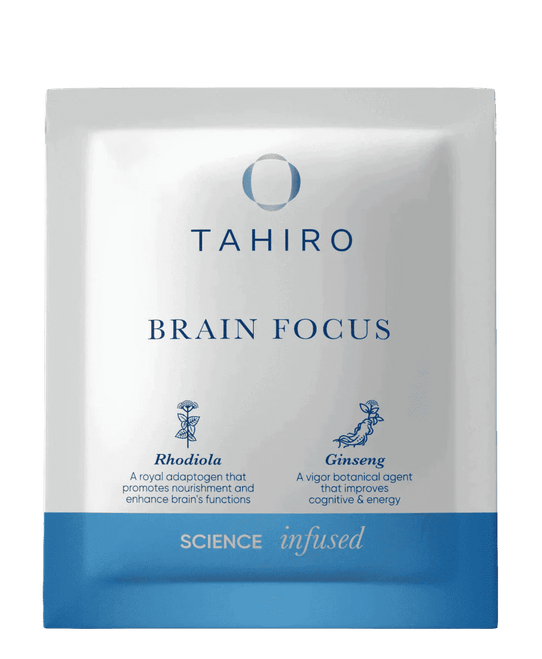Ginseng, commonly known as a traditional remedy, is arootpacked with beneficial compounds, especiallyginsenosides. It has a long history of use for various health benefits, and modern research is exploring its potential in areas likebrain health and stress reduction.
What is Ginseng Root?

Ginseng refers to the root of plants like Panax ginseng, P. quinquefolius, and P. japonicus. These varieties, known as Asian, American, and Japanese ginseng, have been cherished in traditional medicine for over 2000 years. Ginsenosides are the primary active components in ginseng, with over 50 identified types. Modern research suggests other compounds, like polysaccharides, also contribute to ginseng's health benefits [7]. The roots are rich in these compounds, which have been found to possess a wide range of therapeutic properties, such as anti-inflammatory, antioxidant, and immunomodulatory effects [2]. These compounds are chiefly responsible for ginseng's medicinal benefits, including immune support, energy enhancement, and combating fatigue [2].
Ginseng can be categorized into two main types: Asian ginseng (Panax ginseng) and American ginseng (Panax quinquefolius). Although both belong to the same genus, they have different chemical compositions and thus offer varied health benefits [3]. Asian ginseng is generally considered more stimulating, while American ginseng tends to have a milder, calming effect [3]. The term "adaptogen" is often used to describe ginseng, suggesting that it can help the body adapt to various forms of stress[5]. However, it's important to note that the term "adaptogen" is not officially recognized by the FDA.
What Are the Health Benefits of Ginseng?

-
Improve Cognitive Function & Concentration: Ginseng may support brain health by influencing neurotransmitters and promoting brain plasticity [2]. Ginsenosides exert neuroprotective effects, particularly against beta-amyloid-induced neurotoxicity, suggesting potential benefits in cognitive disorders like Alzheimer's disease [1].
-
Reduce Stress: Its adaptogenic and anxiolytic properties might help in managing stress [2]. Ginseng appears to regulate the adrenal glands' synthesis of stress hormones, effectively acting as an adaptogen [7]. Ginsenosides have shown to regulate the hypothalamic-pituitary-adrenal (HPA) axis, affecting the release of corticosteroids and enhancing the body's ability to adapt to stress [7].
-
Reduce Fatigue: Ginseng can potentially reduce feelings of tiredness and fatigue [2].
-
Reduce Inflammation: Ginseng exhibits anti-inflammatory effects, though the exact mechanisms are still being researched [2, 4]. It is thought that Ginsenosides like Rb1 and Rg1 play a role in inhibiting the activation of the NF-kB pathway, a key component in inflammatory responses [8].
-
Improve Immune System: Ginseng's compounds may enhance the body's immune response, aiding in warding off illnesses. Ginseng contains polysaccharides and oligopeptides that have been studied for their immunomodulatory effects. Ginseng polysaccharides are known to enhance the proliferation and phagocytic activity of macrophages [6, 7].
Ginseng Side Effects
Generally, ginseng is seen as safe. However, excessive intake might lead to side effects like high blood pressure [4]. Some studies have noted effects like constipation or insomnia, but these findings weren't consistent across all research [3]. As with any supplement, it's crucial to consult with a healthcare professional before starting a ginseng regimen.
How to Take Ginseng?
The ideal way to take ginseng may vary based on individual needs and the specific product's recommendations. It's available in various forms like capsules, teas, and powders.
Drug Interactions
While ginseng is natural, it can interact with certain medications. Always consult with a healthcare provider before combining ginseng with other treatments.
Is It Safe to Take a Ginseng Root Supplement?
In general, ginseng is considered safe for most people. However, always start with a recommended dose and observe any reactions.
How Long Does It Take for Ginseng to Take Effect?
The time it takes for ginseng to show effects can vary based on individual factors. Given ginseng affects neurotransmitters, it can act fairly quickly [2].
What Does Ginseng Do to the Brain?
Ginseng may support brain health by affecting neurotransmitter function, promoting brain plasticity, and offering neuroprotective properties [2 ,4, 5, 7]. Ginseng and ginsenosides affect the CNS by affecting acetyl choline and GABA, as well as voltage-gated ion channels [2], while polysaccharides present in the plant can affect TNF-a and interleukin-1 [7].
What Is the Recommended Dosage of Ginseng Root?
Generally, most clinical studies suggest a dosage range of 200 to 400 mg of standardized ginseng extract daily. However, always consult with a healthcare professional before starting a new supplement regimen.
Which Supplement Provides the Best Ginseng Extract?

Ginseng's array of benefits has led to its inclusion in numerous health supplements, but not all formulations provide optimal benefits. The quality and effectiveness of ginseng supplements depend on the extraction process, the purity of the root used, and the concentration of active compounds. Tahiro's Brain Focus Formula stands out with its superior quality Panax ginseng extract. Meticulously sourced and expertly processed, the product ensures you receive the maximum therapeutic benefits that ginseng has to offer. In addition to high-grade ginseng, Tahiro's proprietary blend incorporates other renowned cognitive enhancers, ensuring a synergistic boost to brain health. Ingredients in Brain Focus include Rhodiola Extract (root), Rosemary Extract (aerial part), DMAE, Phosphatidylserine (20%), Rhodiola Dry Root Powder, Centella Extract (whole herb), Alpha GPC, L-Glutamine, Ginkgo Biloba Extract (leaf), Guarana Extract (seed), N-Acetyl N-Carnitine, N-Acetyl L-Tyrosine, Huperzine A (leaf), and Paeonia lactiflora Extract.Furthermore, with a 180 mg daily dose of ginseng, Brain Focus can be consumed twice a day, staying within the recommended daily dosage range. Tahiro's Brain Focus Formula adheres to the Generally Recognized as Safe (GRAS) standards, ensuring the product's safety for consumers.







